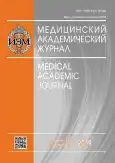DELAYED COGNITIVE DEFICIT AS A RESULT OF NEONATAL LIPOPOLYSACCHARIDE EXPOSURE: A PRESUMABLE IMPLICATION OF LONG-LASTING CHANGES OF NEUROPLASTIC GENE EXPRESSION
- Authors: Trofimov AN1, Zubareva OE1,2, Schwarz AP3, Veniaminova EA1,4, Fomalont K1, Klimenko VM1
-
Affiliations:
- Laboratory of Neurobiology of the Brain Integrative Functions, I.P. Pavlov Department of Physiology, Institute of Experimental Medicine, Saint Petersburg
- Laboratory of Molecular Mechanisms of Neuronal Interactions, I.M. Sechenov Institute of Evolutionary Physiology and Biochemistry, Russian Academy of Sciences, Saint Petersburg
- Multidisciplinary Laboratory of Neurobiology, I.M. Sechenov Institute of Evolutionary Physiology and Biochemistry, Russian Academy of Sciences, Saint Petersburg
- Laboratory of Psychiatric Neurobiology, Institute of Molecular Medicine, Sechenov First Moscow State Medical University, Moscow
- Issue: Vol 19, No 1S (2019)
- Pages: 119-120
- Section: Articles
- Published: 15.12.2019
- URL: https://journals.eco-vector.com/MAJ/article/view/19357
- ID: 19357
Cite item
Abstract
Full Text
About the authors
A N Trofimov
Laboratory of Neurobiology of the Brain Integrative Functions, I.P. Pavlov Department of Physiology, Institute of Experimental Medicine, Saint Petersburg
O E Zubareva
Laboratory of Neurobiology of the Brain Integrative Functions, I.P. Pavlov Department of Physiology, Institute of Experimental Medicine, Saint Petersburg; Laboratory of Molecular Mechanisms of Neuronal Interactions, I.M. Sechenov Institute of Evolutionary Physiology and Biochemistry, Russian Academy of Sciences, Saint Petersburg
A P Schwarz
Multidisciplinary Laboratory of Neurobiology, I.M. Sechenov Institute of Evolutionary Physiology and Biochemistry, Russian Academy of Sciences, Saint Petersburg
E A Veniaminova
Laboratory of Neurobiology of the Brain Integrative Functions, I.P. Pavlov Department of Physiology, Institute of Experimental Medicine, Saint Petersburg; Laboratory of Psychiatric Neurobiology, Institute of Molecular Medicine, Sechenov First Moscow State Medical University, Moscow
K Fomalont
Laboratory of Neurobiology of the Brain Integrative Functions, I.P. Pavlov Department of Physiology, Institute of Experimental Medicine, Saint Petersburg
V M Klimenko
Laboratory of Neurobiology of the Brain Integrative Functions, I.P. Pavlov Department of Physiology, Institute of Experimental Medicine, Saint Petersburg
References
- Zubareva OE, Klimenko VM. Increases in Proinflammatory Cytokine Levels at Early Ages as a Risk Factor for the Development of Nervous and Mental Pathology. Neuroscience and Behavioral Physiology. 2013;43(4):535-541.
- Williamson LL, Sholar PW, Mistry RS, et al. Microglia and memory: modulation by early-life infection. The Journal of neuroscience: the official journal of the Society for Neuroscience. 2011;31(43):15511-21.
- Zavitsanou K, Dalton VS, Walker AK, et al. Neonatal lipopolysaccharide treatment has long-term effects on monoaminergic and cannabinoid receptors in the rat. Synapse. 2013;67(6):290-299.
- Vereker E, Campbell V, Roche E, et al. Lipopolysaccharide inhibits long term potentiation in the rat dentate gyrus by activating caspase-1. The Journal of biological chemistry. 2000;275(34):26252-8.
- Tishkina A, Stepanichev M, Kudryashova I, et al. Neonatal proinflammatory challenge in male Wistar rats: Effects on behavior, synaptic plasticity, and adrenocortical stress response. Behavioural brain research. 2016;304:1-10.
- Trofimov A, Strekalova T, Mortimer N, et al. Postnatal LPS Challenge Impacts Escape Learning and Expression¬ of Plasticity Factors Mmp9 and Timp1 in Rats: Effects of Repeated Training. Neurotoxicity research. 2017;32(2):175-186.
- Veniaminova EA, Zubareva OE. The changes in exploratory behavior and Fgf2 gene expression in cells of the rat brain after the early postnatal administration of bacterial lipopolysaccharide. Neurochemical Journal. 2015;9(2):127-132.
Supplementary files







